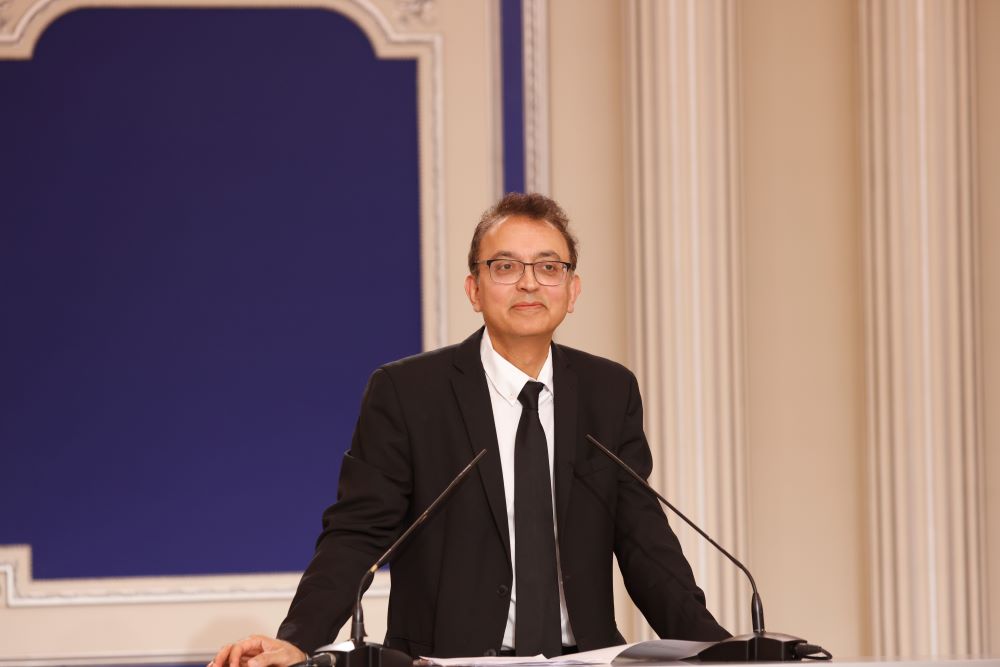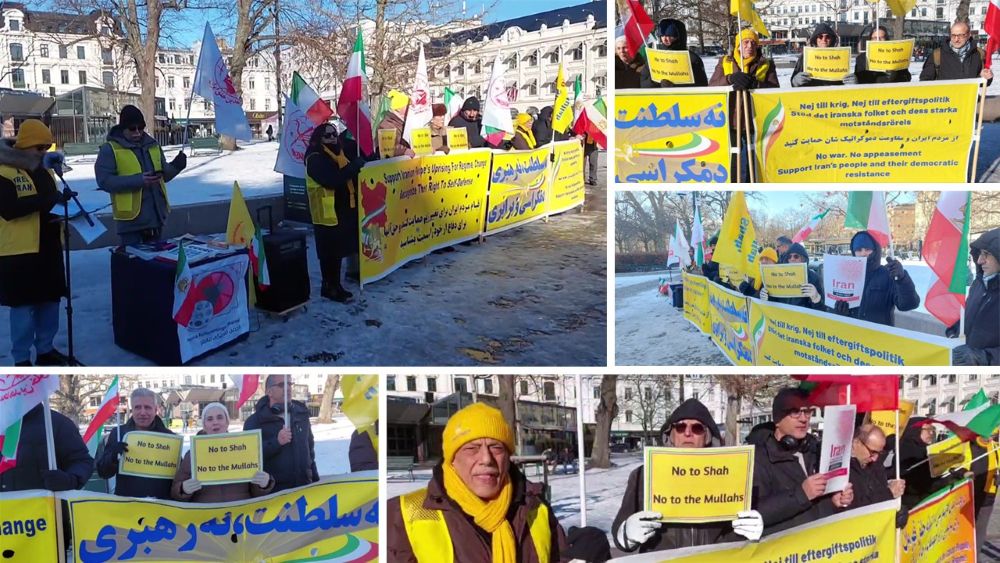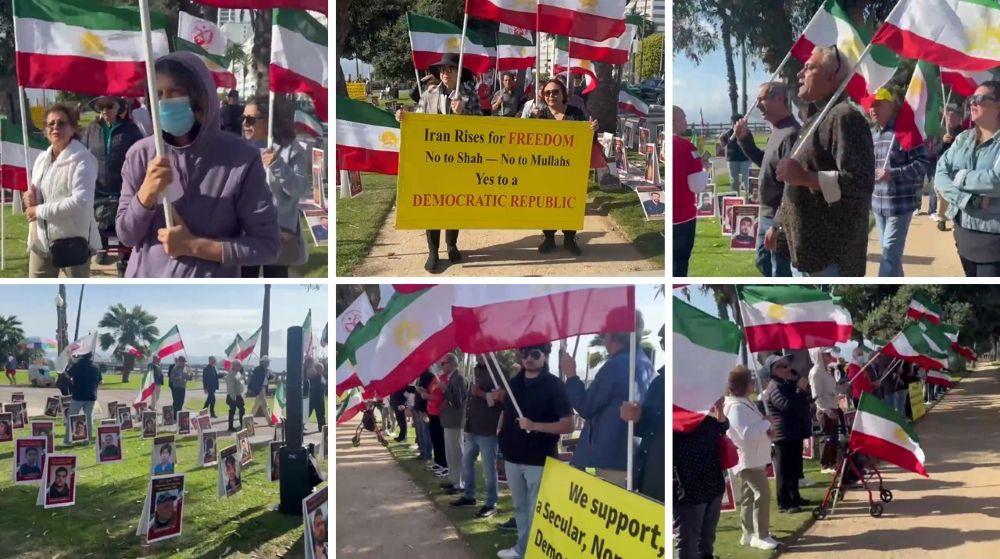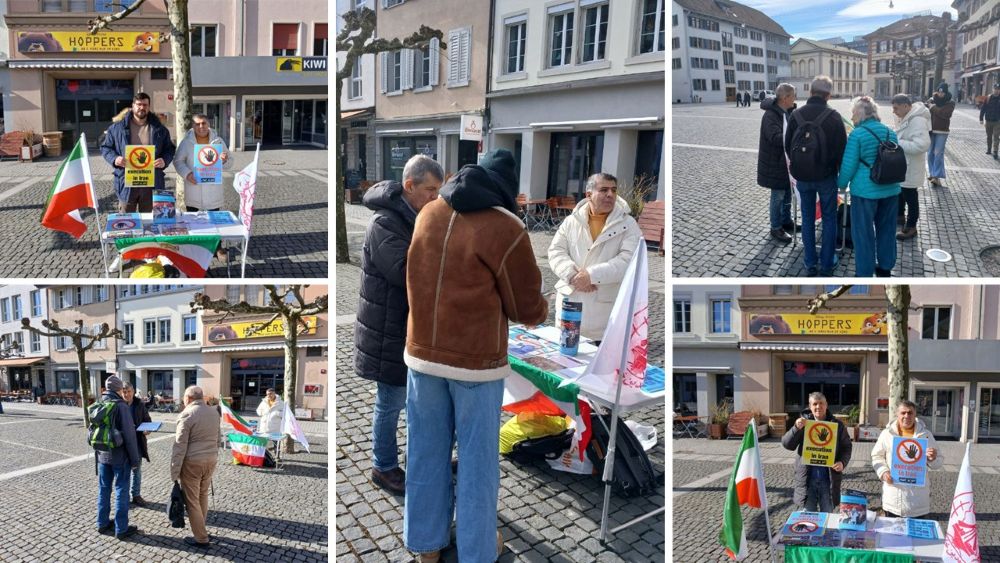
At an international conference focused on human rights violations in Iran, Professor Javaid Rehman, who served as the UN Special Rapporteur on the situation of human rights in Iran from 2018 to 2024, delivered a compelling speech calling on the global community to hold the Iranian regime accountable for its crimes.
Prof. Rehman presented the findings of his recent report, titled “Atrocity Crimes and Grave Human Rights Violations,” which documents the regime’s systematic abuse, mass executions, and acts of genocide since the 1979 revolution, with particular emphasis on the years 1981, 1982, and the 1988 massacre of political prisoners.
In his address, the former UN Special Rapporteur specifically drew attention to the persecution of the People’s Mojahedin Organization of Iran (PMOI/MEK) by the Iranian regime, noting that the mass killings, torture, and other inhumane acts against PMOI members were carried out with genocidal intent. He explained that the regime viewed the PMOI as a deviant and heretical group, which it used as a pretext to systematically exterminate its members under the guise of religious doctrine. Prof. Rehman argued that this targeted persecution amounted to genocide, as the regime aimed to annihilate a religious group that posed a threat to its ideological authority.
Prof. Rehman emphasized that these crimes are not merely historical but represent ongoing violations of international law. He called for the creation of an international investigative and accountability mechanism to conduct thorough and transparent investigations into the crimes committed by Iranian authorities, including genocide, torture, and enforced disappearances. He also urged individual states to exercise universal jurisdiction and initiate criminal investigations against those responsible.
In concluding his remarks, Prof. Rehman underscored the importance of not engaging with a regime responsible for such egregious crimes and called on the international community to ensure justice, truth, and reparations for the victims and their families.
The full text of Professor Javaid Rehman’s speech follows:
Thank you. Good afternoon. There, Mrs. Maryam Rajavi, President-elect, distinguished colleagues and friends. I would like to thank you, firstly, for this invitation, and for this generous and warm reception. I’m most grateful.
Before making my substantive observations on my detailed report, titled, “Atrocity Crimes and Grave Human Rights Violations” that took place in the Islamic Republic of Iran during 1981, 1982, and 1988, which was published, just last month, I would like to express my thanks and appreciation to colleagues, as well as to a number of organizations who have supported me in the completion of this report.
I’m very grateful to my good colleague, Mr. Mohammed Hanif Jazayeri, to Mr. Taher Boumedra, the JVMI, Amnesty International, Abdul-Rahman Broumand Center, and the Rastyad Collective.
I thank that now over 340 distinguished leading international experts and organizations, for generously supporting my work and for being signatories to the recent open letter to the United Nations High Commissioner on Human Rights.
OPEN LETTER
313 UN human rights and legal experts, Nobel laureates, statesmen and NGOs urge UN human rights chief @volker_turk to establish an international accountability mechanism to end impunity for Iran's #1988Massacre & related Atrocity Crimes
👉 https://t.co/FWEny7WAvb pic.twitter.com/Q6cCBklHzb
— Justice for the Victims of 1988 Massacre in Iran (@jvmifoundation) August 16, 2024
Finally, I would also like to thank the office of the United Nations High Commissioner for Human Rights, and all colleagues at the UN, who, despite considerable challenges, supported me in the completion and publication of this important landmark report. I thank everyone. Thank you.
Colleagues, as you would note, my report examines the atrocity crimes that took place from the 1979 revolution. Although, there is an obvious focus on the crimes committed during 1981, and 1982, and with an important detailed examination of the 1988 massacre.
In my report, I have detailed the summary, of arbitrary and extrajudicial executions of thousands of arbitrarily imprisoned political opponents amounting to crimes against humanity of murder and extermination.
There is also a detailed consideration of the crimes against humanity of torture, persecution, enforced disappearances, and other inhumane acts, intentionally causing great suffering to the mental and physical health of the political prisoners.
The executions included those of women, some of them reportedly raped before their executions, and also a very large number of children who were executed.
I have also analyzed the sexual and gender-based crimes against women and girls, as well as the persecution of religious, ethnic, and linguistic minorities during the 1st decade of the establishment of the Islamic Republic in 1979.
Now focused on the 1988 massacre, the report examines the systematic and widespread attack on a civilian population resulting in mass murder, summary, arbitrary, and extrajudicial executions, as well as enforced disappearances of thousands of political prisoners between July to September of 1988.
Today, as we speak, it is 36 years since the tragedy, and yet the crime of enforced disappearances has continued.
An overwhelming majority of the executed persons were members and sympathizers of PMOI, although hundreds of individuals belonging to leftist political groups and organizations were also forcibly disappeared and executed.
There is considerable evidence that mass killings, torture, and other inhumane acts against members of the PMOI were conducted with genocidal intent. And here I endorse the comments made by, my previous speaker, Mr. Lewis and I’m very grateful to him for what he just said.
The case for genocide against members of the PMOI rests, in my view, on the basis that the perpetrators of this crime perceive members of the group as munafiqin. For these perpetrators, members of this group had become deviants. They had deserted Islam and were waging war against Islam.
Insofar as the Iranian theocracy was concerned, PMOI was perceived as a religious group, albeit a deviant and heretical group, with legitimate religious justification for mass executions, torture, and mental and physical harm to members of this group.
For the past 6 years as UN Special Rapporteur on Iran, @JavaidRehman has been outspoken in his calls for an end to impunity in Iran
During a 15 Feb 2024 civil society hearing at the @genevapressclub into the #1988Massacre, Prof. Rehman called on the international community to… pic.twitter.com/f7xsRJoAIc
— Justice for the Victims of 1988 Massacre in Iran (@jvmifoundation) July 26, 2024
In addition to the mass murder, summary, arbitrary, and extrajudicial executions, as well as enforced disappearances of thousands of political prisoners, evidence received confirms that political prisoners who were executed and those who survived the massacre suffered from the most severe forms of physical and mental torture and other cruel inhuman and degrading treatment.
These constitute crimes against humanity and as mentioned, the crime against humanity of enforced disappearances remains a continuing crime until the fate of the disappeared persons and the facts remain uncleared. The victims, thousands of them, were buried in secret and unmarked individual and mass graves across Iran.
And the perpetrators to the great tragedy of all of us, have thus far evaded accountability and justice. Moreover, the families of the victims continue to be denied the right to know the truth.
They are not able to obtain closure as the authorities refuse to clarify the fate of the victims and disclose the whereabouts of their remains, which means that the victims of the 1988 massacre remain forcibly disappeared.
What I have called the atrocity crimes, in particular, the 1988 massacre represent the commission of the worst and the most egregious human rights abuses of our living memory, whereby high-ranking state officials connived, conspired, and actively engaged to plan, order, and commit crimes against humanity and genocide against nationals of their own state.
Notwithstanding the availability of overwhelming available evidence, to this day, those with criminal responsibility for these grave and most serious violations of human rights and crimes under international law remain in power and in control. The international community has been unable or unwilling to hold these individuals accountable.
Indeed, as we have heard already, many of these individuals implicated in these atrocity crimes and the 1988 massacre continue to enjoy official governmental privileges and impunity from international justice and accountability.
Distinguished participants and colleagues, in completing my report, which you have seen, and was published last month, amongst the many challenges that were presented to me was this central question as to why I’m looking back at what many people or many critics said, apparently historic crimes.
A report from our conference where UN Special Rapporteur on Iran Prof. Javaid Rehman presented his landmark report: “Atrocity Crimes and Grave Violations of Human Rights Committed by the Islamic Republic of Iran (1981–1982 and 1988)”. #1988Massacre #HRC56https://t.co/V9d3Kuzbgq
— Justice for the Victims of 1988 Massacre in Iran (@jvmifoundation) June 20, 2024
But as I studied the subject and as my study has confirmed, these are not historic crimes, but they are continuing crimes within international law. And I will give you just 3 key elements of that. Right?
Firstly, as I’ve mentioned to you, the crime of enforced disappearance of thousands of persons is a crime is a continuing crime in international law that remains a crime against humanity as long as the perpetrators continue to conceal the fate of the disappeared persons and the facts remain unclear.
In innumerable cases, families of those who forcibly disappeared, continue to search for their loved ones and I have met many of them throughout my investigation and through the testimonies that I received. They are looking for their loved ones. They’re searching for their loved ones as the authorities persist in violating their rights, including their continual harassment and mental and physical torture and abuse.
The second point that I make is that survivors of these crimes are victims of continuing crimes. Physically and mentally tortured, they continue to suffer in pain and distress. They also remain in immeasurable grief, and undeniable victimhood presents a living testimony to these atrocities. They are living human beings.
As survivors mentioned to me in their testimonies, they’re all faced with mental and physical trauma on a perpetual basis, as they search for a dignified, respectful, and humane closure to their daily suffering and pain. Many testified that this trauma has been passed on to their families and indeed to their younger generations, and they cannot live normal lives. Even the young ones who did not see these atrocities themselves, but they can sense it, they can feel it through their older generations.
All of them are victims who look towards the international community and who look to international experts to find truth, justice, and accountability.
UN Experts Join Survivors of the #1988Massacre in Urging Accountability for Ongoing Crimes Against Humanity in Iran
At civil society hearing in Geneva, victims share evidence with UN Special Rapporteur @JavaidRehman & @WGEID Chair-Rapporteur @balde_auahttps://t.co/JUq2lKNCEG
— Justice for the Victims of 1988 Massacre in Iran (@jvmifoundation) February 22, 2024
Thirdly, if I may add this point, and this is a very important contemporary issue, analyzing the events of the 1st decade after the 1979 revolution provides an important insight and connection with the current day egregious violations of human rights and crimes and international law.
For example, the raison de atre of the women-life-freedom movement commencing, as you know, in September 2022, can be traced back to the resistance to enforce veiling by women in 1979 and in the 1980s, in response to the oppression to which they were subjected after the revolution.
The continued application continued application of the various arbitrary and unjustified laws that we see, the various, provisions of the constitution of the Islamic Republic of Iran, along with the currently applied arbitrary and overbroad national security fences, such as Muharabe, which has been mentioned already, which means waging war against God, Efsad fil-arz, which means spreading corruption on earth, which the Iranian authorities continue to use to execute protesters and other dissidents. And we have heard and seen, the videos relating to that.
The perpetual executions of those arrested as children, as well as the institutional structures through which human rights violations are weaponized and instrumentalized, including through the Islamic Revolutionary Courts. These were all conceptualized, devised, and implemented during this period. Yeah.
Indeed, my view is that had the atrocity crimes of the 1980s, and in particular, the 1988 massacre been prevented by timely intervention by the international community, we would not be witnessing the horrible crimes of today, in particular, the large-scale executions in Iran.
So, colleagues and distinguished participants, I would bring my presentation to a conclusion with a few brief points, if I may.
Firstly, I ask the international community to establish an international investigative and accountability mechanism to conduct prompt, impartial, thorough, and transparent investigations into the crimes and international law, and together, consolidate and preserve evidence with a view toward future criminal prosecution of all the perpetrators.
I also say that the International Accountability Mechanism must investigate the atrocity crimes committed in 1981, 1982, and in 1988 against thousands of political opponents of the authorities.
In particular, the mass summary, arbitrary and extrajudicial executions amounting to the crimes against humanity of murder and extermination, and the continued concealment of the fate of political opponents and the whereabouts of their remains, which amounts to the crime against humanity of enforced disappearance.
Additionally, and secondly, the proposed mechanism must investigate the crimes against humanity of torture, persecution, and other inhumane acts causing great suffering, serious injuries to the bodies, and to the mental and physical health of the political prisoners, as well as the crime of genocide.
Thirdly, this mechanism must conduct prompt and transparent investigations into the pattern of sexual and gender-based violence perpetrated against women and girls, including cases of, reported cases of rape, as well as the repression, persecution, summary and arbitrary and extrajudicial executions of ethnic, linguistic and religious minorities.
Fourthly, in addition to establishing an international accountability mechanism, I have called upon the international community to require the Iranian authorities to inter alias, establish fully the truth regarding the mass enforced disappearances, extrajudicial arbitrary and summary executions, and genocide, provide reparations and all appropriate remedies to the victims, survivors, as well as to the families who were tortured, executed or forcibly disappeared.
I urge individual states, and the point has already been made, I urge individual states to exercise universal and other forms of extraterritorial jurisdiction in relation to crimes under international law committed by the regime by initiating adequately resourced criminal investigations, identifying those suspected of responsibility, including commanders and their superiors, and issuing, when there is sufficient admissible evidence, international arrest warrants.
I will conclude by this point, that we must not engage with a regime whose leaders have committed atrocity crimes. I will just repeat that: We must not engage with a regime whose leaders have committed atrocity crimes. The international community must take concrete steps to end the continuing impunity within Iran, ensuring accountability, truth, justice, reparations, and remedies.
I thank you.
JVMI Welcomes Today’s Landmark UN Report Decrying Iran’s #1988Massacre as Crimes Against Humanity and Genocide
The JVMI calls on UN Member States to establish an international tribunal to bring perpetrators of the 1988 massacre to justice.https://t.co/WKheTERMEk
— Justice for the Victims of 1988 Massacre in Iran (@jvmifoundation) July 22, 2024



